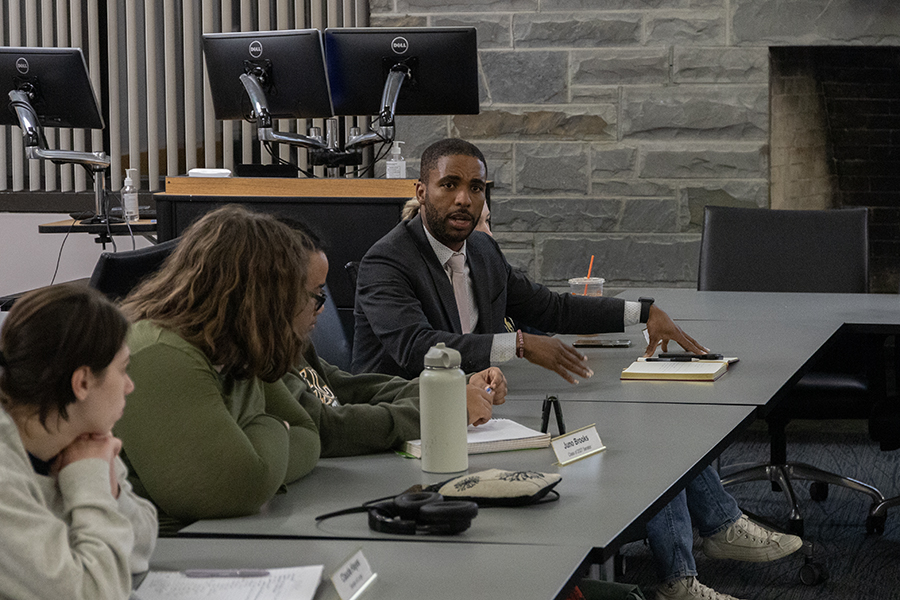The City of Ithaca is considering a complete ban on fracking, according to Jennifer Dotson, chair of Common Council’s Planning Committee. The town of Ithaca, as well as the towns of Dryden and Ulysses, have already banned fracking via zoning regulation.
At their meeting last month, Dotson said the committee decided to pursue a ban on fracking on city-owned land, which includes areas near the watershed where the city water supply comes from. The group also discussed a zoning ban that would prevent fracking within city limits.
Last year the U.S. Environmental Protection Agency began a study of the fracking practice to “understand any potential impacts of hydraulic fracturing on drinking water and groundwater,” according to the agency’s website. Initial research results are estimated to be completed by the end of 2012. The agency intends to have a final report in 2014.
Eric Rosario, vice chair of the planning committee, said one of the most important tasks of The City of Ithaca is considering a complete ban of horizontal hydraulic fracturing — also known as fracking — within city limits, while state and federal governments still have not determined whether the natural gas extraction process is safe.
Ithaca would be among the growing number of local governments in central New York to take preventative measures when the federal government has not yet done so.
The New York Department of Environmental Conservation last week released a report titled “2011 Recommendations For Permitting High-Volume Hydraulic Fracturing in New York State.”
In the document, the DEC suggests an exclusive protection of the Syracuse and New York City watersheds. This includes the Skaneateles Lake and Catskill/Delaware watersheds. Ithaca, along with a significant percentage of the rest of the state, is not directly protected.
Fracking is an extraction process used to remove underground resources such as natural gas and oil trapped in the shale below. The Marcellus Shale, which lies below Ithaca through Pennsylvania, is a rock formation in which 168 to 516 trillion cubic feet of natural gas is trapped, geologists estimate. The fracking process uses about 5 million gallons of water, mixed with sand and chemicals, to pump into the ground to release the gas.
The City of Ithaca is considering a complete ban on fracking, according to Jennifer Dotson, chair of Common Council’s Planning Committee. The town of Ithaca, as well as the towns of Dryden and Ulysses, have already banned fracking via zoning regulation.
At their meeting last month, Dotson said the committee decided to pursue a ban on fracking on city-owned land, which includes areas near the watershed where the city water supply comes from. The group also discussed a zoning ban that would prevent fracking within city limits.
Last year the U.S. Environmental Protection Agency began a study of the fracking practice to “understand any potential impacts of hydraulic fracturing on drinking water and groundwater,” according to the agency’s website. Initial research results are estimated to be completed by the end of 2012. The agency intends to have a final report in 2014.
Eric Rosario, vice chair of the planning committee, said one of the most important tasks of the committee is to respond to the supplementary, generic environmental test that the state has now completed concerning the safety of hydro-fracking. The comment period ends in December, and Rosario said the committee needs to let the state know what the City of Ithaca thinks of their report.
Heavy truck traffic around drilling sites also raises concerns when it comes to fracking. Rosario said trucks that are traveling to and from fracking sites often carry hazardous materials. Water safety is also a major concern that the committee is exploring, he said.
Dotson said it is important to ensure that Ithaca roadways are safe. The committee will review road preservation laws to analyze how the trucks could violate the preservation law.
While local governments and organizations, like Frack Off, work to ban fracking in New York, some residents are excited by the prospect of drilling in the state.
More than 2.8 million American jobs are supported by natural gas, according to Friends of Natural Gas NY, an alliance of New York state residents who support the development of clean, natural gas.
A 2010 Pennsylvania State University study found that the Marcellus Shale could generate nearly $19 billion in economic value per year and 200,000 jobs by 2020.
As the City of Ithaca works to prevent fracking within the region, Frack Off, an on-campus group, hopes to prevent drilling not only in the city, but also statewide.
The group is moving into its second semester with plans to combat the practice in Ithaca and New York state as a whole.
Like the city’s planning committee, the group wants to respond to the DEC’s environmental safety report on fracking. The organization hopes to grow a strong resistance before the response deadline in December.
The group hopes to enlist supporters of the movement through a youth conference during mid-October in Albany, executive board member Ben Lloyd said.
The fracking opposition on campus does not stand alone, Garrison said. By joining together with other groups, Frack Off is working towards a larger-scale movement to help gain more attention from communities, she said.
Lloyd said both horizontal and vertical fracking are dangerous extraction processes.
“Something a lot of people might not know is that vertical fracking has been happening in New York for the past decade,” Lloyd said, “It’s almost as bad as horizontal fracking, it just doesn’t use as much water.”









